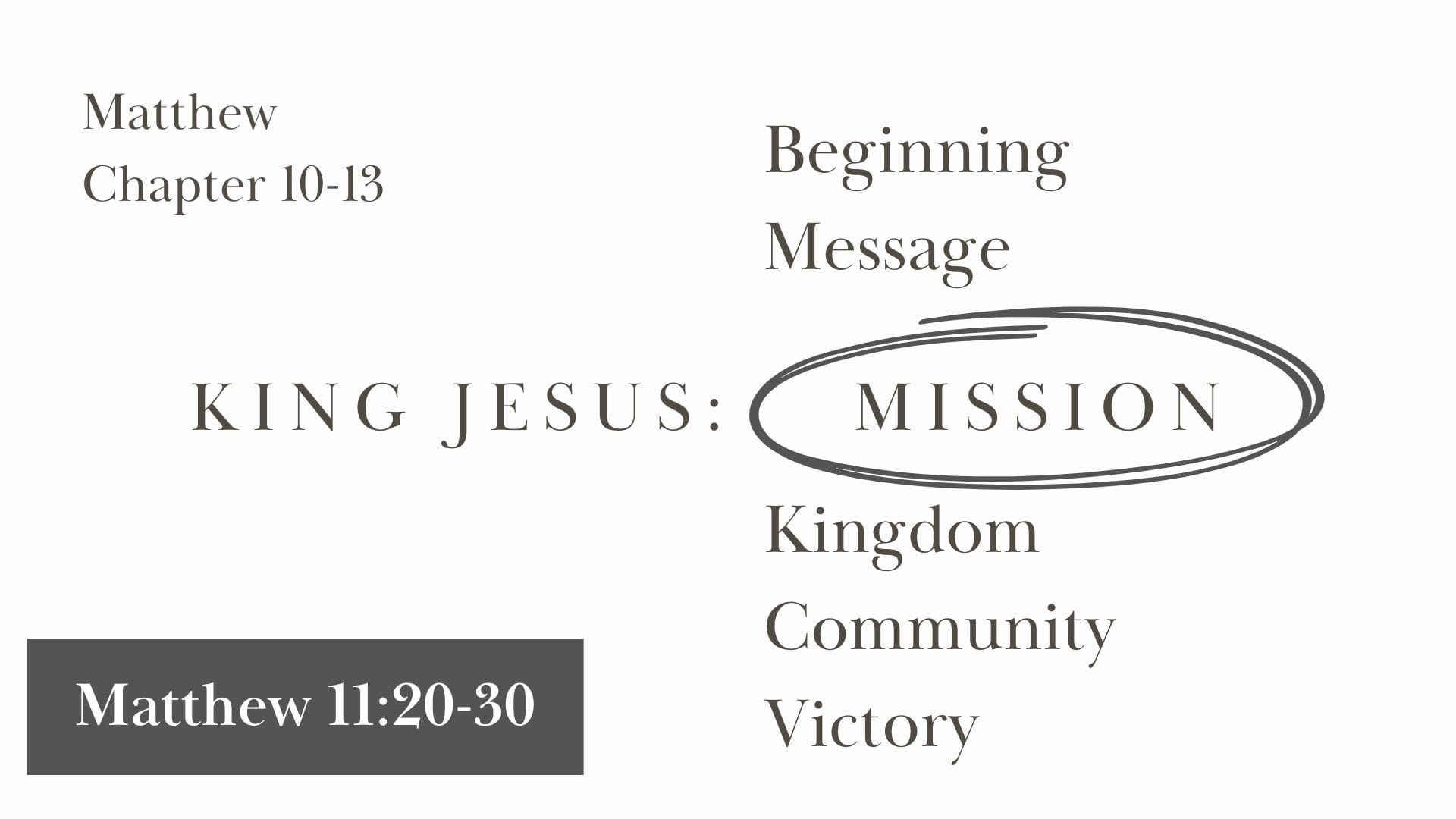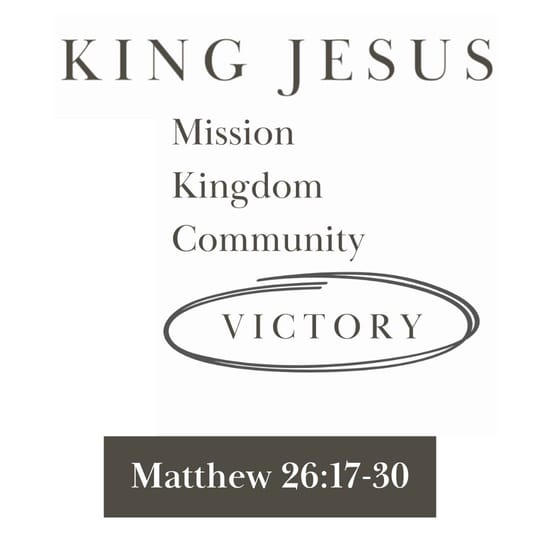Text:
Then Jesus began to denounce the towns where he had done so many of his miracles, because they hadn’t repented of their sins and turned to God. “What sorrow awaits you, Korazin and Bethsaida! For if the miracles I did in you had been done in wicked Tyre and Sidon, their people would have repented of their sins long ago, clothing themselves in burlap and throwing ashes on their heads to show their remorse. I tell you, Tyre and Sidon will be better off on judgment day than you. “And you people of Capernaum, will you be honored in heaven? No, you will go down to the place of the dead. For if the miracles I did for you had been done in wicked Sodom, it would still be here today. I tell you, even Sodom will be better off on judgment day than you.” At that time Jesus prayed this prayer: “O Father, Lord of heaven and earth, thank you for hiding these things from those who think themselves wise and clever, and for revealing them to the childlike. Yes, Father, it pleased you to do it this way! “My Father has entrusted everything to me. No one truly knows the Son except the Father, and no one truly knows the Father except the Son and those to whom the Son chooses to reveal him.” Then Jesus said, “Come to me, all of you who are weary and carry heavy burdens, and I will give you rest. Take my yoke upon you. Let me teach you, because I am humble and gentle at heart, and you will find rest for your souls. For my yoke is easy to bear, and the burden I give you is light.”
As we follow Jesus, He EMPOWERS us to MAKE A DIFFERENCE.
Overall Commentary: 🌎
Jesus is about to finish His comments concerning the generation He is surrounded by. He has given them the "keys to the Kingdom" in the Sermon on the Mount. He has sent out the 12 disciples. He has dealt with their doubt. He finishes by sharing the whole Gospel in a nutshell. It begins with bad news and ends with the best news ever.
As we follow Jesus, we are INVITED to the ADVENTURES OF A LIFETIME.
Commentary
Verse 20-24: Bad News: He warns the unrepentant and indifferent.
Jesus has been going through the countryside and doing various forms of ministry. He has a "moving city" following Him at this point. Yet some do not believe. Jesus loves us more than we can imagine. He loves us enough to perform an "intervention" and tell us the truth. The truth is judgment will come to those who turn from Him. If they do not receive the Gospel, nothing else is coming.
- Who are the unrepentant?: The cities Korazin and Bethsaida.
- Who are the indifferent?: Capernaum.
- Korazin and Bethsaida: Both of these cities are close to the region where Capernaum is. These towns are likely where many of His disciples have come from. They have witnessed the majority of the miracles.
- Tyre and Sidon: These are notorious cities cited by various prophets in the Old Testament as cities with bad reputations. They were seen as Baal-worshiping, excess-driven cities worthy of God's judgment. Therefore, to say these cities would have listened to Jesus more is a slap in the face.
- Capernaum: This is Jesus' ministry headquarters Likely, most of His miracles would have been done close by. Jesus says they had become indifferent to the miracles and saw them more as a status symbol than proof of the Kingdom of God. They had completely lost perspective.
- Sodom: Thought to be the worst city in Biblical history. This city is found in Genesis 19. It was destroyed for terrible sexual depravity.
- Does God have levels of judgment?: Short answer, yes. Just like in our modern justice system, there are various levels of punishment to fit various levels of crime. However, that is likely not what Jesus is going for in these statements. He uses hyperbole to say these towns should be careful because of the hardness of their hearts.
- Why did Jesus do miracles?: Have you ever wondered why Jesus performed miracles? Why would God allow miracles at all since they change the laws of nature He created? The main reason is to point to Jesus being more than a person. It was intended to bring attention to the Gospel.
Verse 25-27: Good News: He celebrates the rescue mission.
There are four Gospels. Matthew, Mark, and Luke are called the Synoptic Gospels because they all have a similar narrative. They are all focused on telling the story of Jesus' life, with the climax being the Resurrection. The fourth Gospel, the Gospel of John, focuses on the message and Divinity of Jesus. One could say the climax of the Gospel of John comes in the first verse that defines Jesus as God. Everything springs from there. Because the focus of John is on the Divinity of Jesus, this passage is referred to as "Johnniane Mic Drop."
- Father/Son relationship: The theology of the Trinity is beautiful and mysterious. We serve One God, Three in Person. The Father sent the Son. The Son reveals the Father. The Spirit proclaims the Son. Jesus is alone able to show us the Father. That is why He came. To reconcile us back to Himself.
- Appear to be wise: These are the ones who feel they can get to God through knowledge and understanding alone. Knowledge and understanding are important. However, God always requires a step of faith.
- Childlike: This word can also mean unassuming or innocent. The idea is those who have taken God at His Word and fully embraced the hope of salvation; fully Trusted like a child.
- Is this a Calvinistic Scripture?: The theological framework of Calvinism says that God chooses whom He will save. We have no say in it. This implies He does not reach out to everyone, only the elect. This is a gross oversimplification of Calvinism, and I apologize to all the Calvinists who read this. The question is, does this Scripture point to Jesus only reaching out to a few? My opinion is it does not. The passage says that everyone who hears the Gospel only does so because of the Goodness of Jesus to come to Earth. Therefore, this is not an exclusionary passage. It is a passage saying we only know of salvation because of Christ.
Verse 28-30: The Best News: He invites all to come.
This section of Scripture is one of the most beautiful in the entire Gospels. Jesus lays out perfectly what the Gospel is. The Gospel says all can come to have their sins washed away and their life healed.
- Come to me, All who are weary and carry heavy burdens, and I will give you rest: The heavy burdens are the legalistic striving prescribed by the Pharisees. They said the only way to reach Heaven was through legalism and constant striving. The only way to get to Heaven is through merit. Jesus says He wants to take away that weight and rest your soul. That's what salvation is. He takes on the weight of your sin and gives you rest.
- Take my yoke: A yoke is a farming tool that helps farm animals carry heavy loads. It was also used by religious teachers of the time to refer to their teaching system. Jesus is saying the system or yoke of the Pharisees was like an ill-fitting yoke that only leaves the animal broken and unable to move forward. The other way of seeing this is the way you properly would use a yoke is to strap it to two animals. The two animals would learn to work together and work in the sink. As they worked together, they learned to keep in a rhythm and could work for long hours without injury.
- Let me teach you: This is why Jesus invited them to become His disciples and learn to live according to the rhythms of His grace.
- What does it mean for Jesus to be "humble?": Humble can mean not to think less of yourself but to think of yourself less often. This would mean Jesus is doing this with nothing to gain for Himself. He is doing this completely for you.
- What does it mean for Jesus to be "gentle?": Gentleness is not weakness. Gentleness is strength under control. Jesus has all the power of the Universe but walks slowly with us.
- Jesus' yoke is "easy?": The word "easy" means it fits just how it is supposed to without causing injury. It fits easily.
- Jesus' yoke is "light?": Because we learn the unforced rhythms of His grace, our load does not go away. We still have cares of this life in the form of family, financial obligations, and more. The difference is God with us all the way.
What can we learn from this passage?
I have a mentor whom I've never met. His name was Eugene Peterson. He was a pastor for many years and paraphrased the Bible in a way to bring a fresh perspective to God's Word. He would say that it was not intended to place your normal reading Bible. It was intended to be an almost running commentary of Scripture. He eventually finished paraphrasing the entire Bible, and it's now called The Message. The final section of this passage encapsulates some of the most beautiful statements in the entire Bible. Jesus came for us all.
To finish our commentary today, let's read how Eugene Peterson paraphrases Jesus's words. Jesus came for me and you. You have never been more loved than you are right now.
Are you tired? Worn out? Burned out on religion? Come to me. Get away with me and you’ll recover your life. I’ll show you how to take a real rest. Walk with me and work with me—watch how I do it. Learn the unforced rhythms of grace. I won’t lay anything heavy or ill-fitting on you. Keep company with me and you’ll learn to live freely and lightly.
Questions/Journal Prompts for reflection:
- The Good News begins with Bad News. What does that mean?
- Why do you think some people are indifferent about God?
- What do you need to bring to God’s rest?
- After today’s message, what is your next step?
Resources For Further Study
- Blue Letter Bible: Cross-Reference/Word Studies/Translations
- How to Cross-reference passages. Let the Bible interpret the Bible.
- BibleHub.com: So. Many. Tools.
- Sending Out the Twelve from Enduring Word
- Bible Study Notes: The First Mission
- Matthew Henry Commentary
- Instruction the Twelve From One Hope Fellowship
- Principles of Ministry








